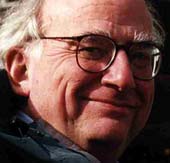|
Michael Gazzaniga
–
psychologist and cognitive neuroscientist
|

|
"
There isn't ten cents worth of difference between the Kalahari bushman and the Oxford don.
" |

|
| |
|
|
|
| |
How were you motivated to choose your particular field? |
| |
When I was a young boy, our neighbor commented to my father one day that "Mike is going to be a philosopher". I don't know why he said that but I always had a bug in my bonnet to examine things. My father was highly curious and always trying to tinker with surgical procedures to improve the lot of his patients. Maybe I picked up on this. In high school I set up a laboratory in the garage to study the enzymes of rabbit muscle. My brothers and sisters also very much liked to tinker. One became a surgeon and the other a film maker, writer and creative artist. Maybe there is a gene in the family.
When I was older I was drawn into the field following a summer fellowship I received from Roger W Sperry at Caltech. I had written him about a job after I had read an article he had written on nerve growth for Scientific American. It was a captivating article and since Caltech was next door to where my girlfriend lived, I thought it would be a great idea spending the summer studying nerve growth.
After I arrived at Caltech, I saw for the first time, a bustling research lab and most of the scientists were working on animal models of split–brain research. It was fantastically interesting to a neophyte like myself and I have never looked back since. How the brain enables the mind is such a challenging subject, one gets out of bed every morning with vigor and purpose.
|
|

|
| |
|
|
|
| |
What can you share about your creative process? |
| |

|
|
I am one of those who thinks the creative process is directly related to the amount of time one spends mulling something over. I come back and revisit ideas, data, thoughts, all the time. I think this keeps key semantic networks active and then "bingo" an inconsistency or consistency suddenly presents itself to consciousness and the beginnings of a new idea appear.
|
|
| |
|
|
|
| |
What ideas do you have for a future human community on Mars?
|
| |
The human community will bring to Mars their brains. Fortunately or unfortunately that means it brings with them all the scripts and pre–wired programs for how we think, what we enjoy and how we form our coalitions. There isn't ten cents worth of difference between the Kalahari bushman and the Oxford don. The cultural patina is different to be sure but the basic drives and mental capacities are more similar than different.
Ideas about how to change the basic nature of humans have failed, repeatedly. Thus, the community on Mars should take note of the good and tried ways humans have to enjoy each other on earth and take those plans to Mars. If they don't, they will have unhappy people on Mars. The Brazilian government tried to change the way Brazilians should live with the town of Brazilia. That colossal failure is right up there with China's attempt at the Great Leap Forward.
New environments are fascinating and challenging. We combine elements of the new place with different outcomes. Yet, the piece of biologic tissue that does these wonderful things is the same for all humans and hasn't changed in thousands of years. On Sunday afternoon on Mars, citizens of the New City will still love a cold beer and a good NFL game.
|
|

|
|




